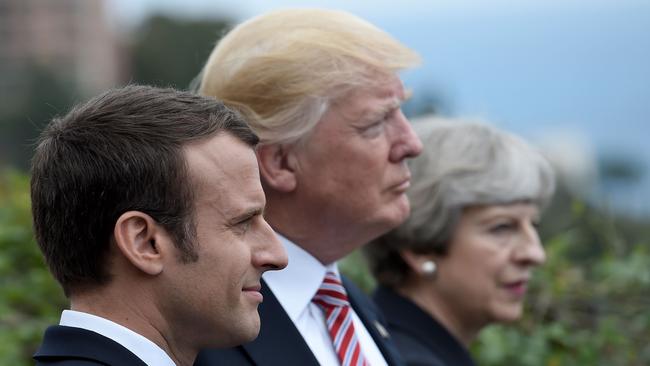
The combined American, British and French strike on Syria is the most important geo-strategic development of the Trump era so far.
Donald Trump looks infinitely more formidable acting in the company of Theresa May and Emmanuel Macron.
This is a much more important development than Trump’s earlier missile strike on Syria. It flatly contradicts the idea that the Trump administration is isolationist.
Once again, Trump has done what Barack Obama could not do, even though he claimed he would. The strike on Syria had serious purposes — strategic, tactical, political, moral.
Nothing that the West has done has worked well in Syria, but it is possible to discern all the main purposes in the joint allied action, which was strongly supported by Australia, both from the government and the opposition, Germany and other allied and Western nations.
First, strategic.
Russia and China, though Moscow vastly more egregiously than Beijing, are consistently and seriously threatening international norms, especially the one that states do not acquire territory through military conquest.
Moscow, in enabling its Syrian client to conduct chemical attacks, as well as using nerve agents to attack Sergei Skripal and his daughter in Salisbury, are mounting the most aggressive challenge to the long-held convention against using chemical weapons.
That Bashar al-Assad has so consistently used chemical weapons demonstrates the fatuousness and emptiness of the deal Obama secured with him to get rid of Syria’s chemical weapons.
These combined strikes thus have a serious strategic purpose. They are a genuine, proportionate attempt to prevent Assad from using such weapons again, by raising the cost to him for doing so.
Washington, London and Paris, with the strong political support of allies, are rallying strongly to attempt to maintain this critically important norm.
It is also important to show Assad, and other actors in the Middle East, that alliance with Russia and Iran does not insulate him from being struck by the West.
The move also has tactical purposes. It will seriously degrade Syria’s chemical weapons capability. It helps Israel in its efforts to prevent Iran from establishing bases in Syria. To some extent it reassures America’s Syrian allies, in particular the Kurds, that the US still counts in Syria.
The move has broader political purposes. Trump, May and Macron are vastly different political leaders. The American is a nationalist populist, more traditionally Republican than his critics allow, but vastly unconventional. May is an old-style cautious conservative, leading a government beset by Brexit. Macron is a successful, bold centrist, with a free market economic agenda, socially liberal but with a hard head on security.
That these three can easily set aside any stylistic differences and come together in a single strategic action sends a powerful political message that the West is strong and not to be underestimated.
Finally, the strike has a serious moral purpose. The Syrian conflict may be stabilising and that is broadly a good thing, or at least perhaps the least worst thing. But Assad’s use of chemical weapons is a cruel crime against humanity.
It was enough to provoke Obama to declare it a “red line” though he finally wimped out of doing anything. Indeed, given Obama’s fraudulent threats and the worthless process he accepted of Assad allegedly giving up his chemical weapons, it seems his relationship to strategic truth was at least as problematic as Trump’s.
But the three amigos of the West expressed in this strike a genuine moral revulsion at Assad’s actions and made an effort to spare the Syrian people from suffering them again.
None of these purposes may be successfully reached, but the three Western leaders have acted with serious intent, a reasonable chance of success and legitimate moral purpose. That is a good thing for humanity.

















